|
|
|
Sort Order |
|
|
|
Items / Page
|
|
|
|
|
|
|
| Srl | Item |
| 1 |
ID:
126306
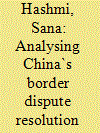

|
|
|
|
|
| Publication |
2013.
|
| Summary/Abstract |
South Asia, as a region, has always ranked high in importance in China`s foreign policy calculations. Since its inception on October 1, 1949, China has had enduring interests in South Asia which is basically a derivative of the subcontinent's location on China`s southwestern flank, next to the troublesome Tibetan and Xinjiang regions. One of the primitive determinants of China`s South Asia policy was its borders dispute with five countries of the region. China shares land border with five South Asian countries, namely, Afghanistan, Bhutan, India, Nepal and Pakistan. These five South Asian countries got involve in latent boundary disputes with China as soon as the People`s Republic of China (PRC) was established and the colonialist power left the Indian subcontinent.
|
|
|
|
|
|
|
|
|
|
|
|
|
|
|
|
| 2 |
ID:
176538
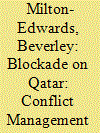

|
|
|
|
|
| Summary/Abstract |
Current tensions in the Gulf region highlight the persistence of crises and conflict. A number of states within the area now regularly engage in interventionist actions that challenge previously held norms of sovereignty and non-intervention. Fragmentation characterises what were once considered fairly robust structures of unity and enduring regional organisation. Theoretical norms that presuppose non-intervention are tested by new forms of coercion and interventionism among Gulf actors that exacerbate rather than resolve security dilemmas. In turn, this highlights the inadequacies of normative models of conflict management and resolution, and in particular mediation. These developments are examined in the case of the blockade against Qatar instituted by Bahrain, Egypt, Saudi Arabia and the United Arab Emirates in June 2017.
|
|
|
|
|
|
|
|
|
|
|
|
|
|
|
|
| 3 |
ID:
185947


|
|
|
|
|
| Summary/Abstract |
The Kashmir has an intriguing political and social landscape. The idea of Kashmir is nonetheless guided by multiple narratives created by different stakeholders in Kashmir. The Kashmir falls under the control of three nuclear powers, namely India, Pakistan and China. The accession of an erstwhile princely state of Kashmir to India had different conflicts in store, with the result of which South Asian nuclear-armed neighbours fought three wars to claim the Kashmir territory, besides coming close to a nuclear blaze. The argumentation about the Kashmir among different stakeholders in Kashmir poses the threat to peace in South Asia. We look at different perspectives of various stakeholders. In this paper, we attempt to emphasize that why none of the stakeholders wants a resolution for Kashmir conflict and why all of them want Kashmir, if not to burn but it must simmer continuously.
|
|
|
|
|
|
|
|
|
|
|
|
|
|
|
|
| 4 |
ID:
093257


|
|
|
|
|
| Publication |
London, Routledge, 2010.
|
| Description |
xii, 243p.Pbk
|
| Standard Number |
9780415450416
|
|
|
|
|
|
|
|
|
|
|
|
Copies: C:2/I:0,R:0,Q:0
Circulation
| Accession# | Call# | Current Location | Status | Policy | Location |
| 054662 | 658.4053/JEO 054662 | Main | On Shelf | General | |
| 055121 | 658.4053/JEO 055121 | Main | On Shelf | General | |
|
|
|
|
| 5 |
ID:
107478


|
|
|
|
|
| Publication |
2011.
|
| Summary/Abstract |
A biological attack would present an unprecedented challenge for local, state, and federal agencies, the military, the private sector, and individuals on many fronts, ranging from vaccination and treatment to prioritization of cleanup actions to waste disposal. To prepare for recovery from this type of incident, the Seattle Urban Area Security Initiative (UASI) partners collaborated with military and federal agencies to develop a regional recovery framework. The goal was to identify key information that will assist policymakers and emergency managers in shortening the timeline for recovery and minimizing the economic and public health impacts of a catastrophic anthrax attack. Based on discussions in workshops, tabletop exercises, and interviews with local, state, federal, military, and private sector entities responsible for recovery, the authors identified goals, assumptions, and concepts of operation for various areas to address critical issues the region will face as recovery progresses. Although the framework is specific to a catastrophic, wide-area biological attack using anthrax, it was designed to be flexible and scalable so it could also serve as the recovery framework for an all-hazards approach in other regions and jurisdictions. Benefits from this process include enhanced coordination and collaboration across agencies, a more thorough understanding of the anthrax threat, an opportunity to proactively consider long-term recovery, and a better understanding of the specific policy questions requiring resolution.
|
|
|
|
|
|
|
|
|
|
|
|
|
|
|
|
| 6 |
ID:
128026
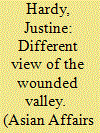

|
|
|
|
|
| Publication |
2014.
|
| Summary/Abstract |
The Kashmir question is felt by many to be beyond resolution. As many again regard it as a situation wherein the status quo of on-going violence is now a 'conflict industry' with too much vested interest in play for any genuine avenues of negotiation to be pursued. The Kashmir Valley seems to have joined the long list of often forgotten Balkanised stories about unresolved hostilities written around the themes of geopolitics and jingoistic nationalism. The psychotherapist Justine Hardy looks at the question from another point of view, that of the psychological state of the people of Kashmir, the real stakeholders in any possible agreement between Pakistan and India over the disputed state of Jammu and Kashmir. She presents the case for adding another approach to those that appear to have stalled along the way.
|
|
|
|
|
|
|
|
|
|
|
|
|
|
|
|
| 7 |
ID:
083839


|
|
|
|
|
| Publication |
2008.
|
| Summary/Abstract |
Export controls and international safeguards are central to ensuring international confidence in the peaceful uses of nuclear materials and technologies and to achieving adequate oversight on the transfer and use of nuclear materials, technology, and equipment required for the development of proliferation-sensitive parts of the nuclear fuel cycle. Although the independent strengths of export controls and international safeguards rely largely on universal adherence, there may be opportunities to exploit the shared strengths of these systems. This article provides background information on the separate evolution of export controls and international safeguards, considers how these two elements of the nonproliferation regime interact, and identifies some possible avenues that could, over time, lead to wholly integrated activities.
|
|
|
|
|
|
|
|
|
|
|
|
|
|
|
|
| 8 |
ID:
086720
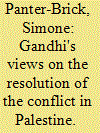

|
|
|
|
|
| Publication |
2009.
|
| Summary/Abstract |
This historical analysis of Mahatma Gandhi's views on the Jewish-Arab conflict in Palestine at the time of the British Mandate distinguishes four phases. The initial involvement is Gandhi's intervention in support of the Caliph's temporal rule in Palestine. The second deals with a secret offer of mediation addressed to the Jewish Agency in Jerusalem. The third is his highly controversial letter to 'The Jews'. In the last phase, Gandhi chose to remain silent, but is alleged to have stated that the Jews had a good case and a prior claim, a statement that seems at variance with previous attitudes. The question is raised as to how far Gandhi's views were consistent. They are explained by the evolving political context in India, as well as in Palestine, the two being intertwined in an ever tightening knot. Gandhi's commitments are revisited and clarified in the light of new research.
|
|
|
|
|
|
|
|
|
|
|
|
|
|
|
|
| 9 |
ID:
077882
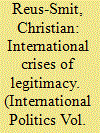

|
|
|
|
|
| Publication |
2007.
|
| Summary/Abstract |
What is an international crisis of legitimacy? And how does one resolve such crises? This article addresses these conceptual issues, laying the theoretical foundations for the special issue as a whole. An actor or institution experiences a crisis of legitimacy, it is argued, when the level of social recognition that its identity, interests, practices, norms, or procedures are rightful declines to the point where it must either adapt (by reconstituting or recalibrating the social bases of its legitimacy, or by investing more heavily in material practices of coercion or bribery) or face disempowerment. International crises of legitimacy can be resolved only through recalibration, which necessarily involves the communicative reconciliation of the actor's or institution's social identity, interests, practices, norms, or procedures, with the normative expectations of other actors within its realm of political action
|
|
|
|
|
|
|
|
|
|
|
|
|
|
|
|
| 10 |
ID:
154701
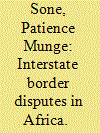

|
|
|
|
|
| Summary/Abstract |
Many researchers have focused on the role colonialism has played in causing interstate border disputes in Africa. Besides the colonial issue, this paper seeks to investigate what other factors fuel interstate border disputes in Africa and determine how effectively the disputes can be resolved. In recent decades, Africa has been tormented by and is still experiencing numerous interstate border disputes which have serious implications for the disputing states. Some of the disputes are resolved, but violations of human rights and instability still occur in these regions. By analysing the content of some relevant documents and with the use of interviews, this paper reveals that most disputing African states rely heavily on foreign intervention (especially by their erstwhile colonial masters) in the resolution of their disputes. It is argued that African leaders need to be more committed and exhibit better leadership in resolving their border disputes, and that they should always seek the expertise of African forums such as the African Union (AU) before calling for foreign intervention. It is suggested that African leaders and the AU understand the problems of Africans better than anyone else, and they are also the ones mostly greatly affected by these disputes. Thus, there needs to be more of a focus on addressing the root causes of disputes in order to avoid them resurfacing, rather than seeking to merely halt them.
|
|
|
|
|
|
|
|
|
|
|
|
|
|
|
|
| 11 |
ID:
084579
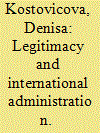

|
|
|
| 12 |
ID:
095123
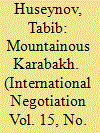

|
|
|
|
|
| Publication |
2010.
|
| Summary/Abstract |
This article analyzes the Karabakh conflict's peace process and suggests a set of approaches to guide future progress. Proceeding from an interest-based framework, the research examines ways to reconcile the power, rights and interests of the conflicting parties. It is argued that a serious shift in the approaches and policies of both the conflicting parties and also the mediators is needed to achieve a breakthrough in the talks. In broader and long-term perspective, stable and sustainable conflict resolution requires the establishment of a power-sharing arrangement that would be based on equal and horizontal relationships between Armenians and Azeris at both sub-national (Mountainous Karabakh), and national (Azerbaijan) levels, and combines this power-sharing arrangement with regional integration.
|
|
|
|
|
|
|
|
|
|
|
|
|
|
|
|
| 13 |
ID:
089351
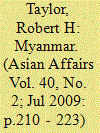

|
|
|
|
|
| Publication |
2009.
|
| Summary/Abstract |
The author argues that Western policy towards Myanmar over the last twenty years has been not only demonstrably ineffective, but has also completely ignored the admittedly somewhat hesitant efforts of the military regime to improve relations with the West. Although the regime has been presentationally inept, the generals do seem to be moving towards some sort of elections in 2010. The West will need to decide how to respond to those elections. Continuing total condemnation of the regime may not be the best option.
|
|
|
|
|
|
|
|
|
|
|
|
|
|
|
|
| 14 |
ID:
045826


|
|
|
|
|
| Publication |
London, macmillan Press, 1989.
|
| Description |
155p.hbk
|
| Standard Number |
0333517962
|
|
|
|
|
|
|
|
|
|
|
|
Copies: C:1/I:0,R:0,Q:0
Circulation
| Accession# | Call# | Current Location | Status | Policy | Location |
| 031214 | 968.063/GIL 031214 | Main | On Shelf | General | |
|
|
|
|
| 15 |
ID:
117402
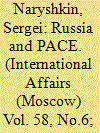

|
|
|
|
|
| Publication |
2012.
|
| Summary/Abstract |
ON OCTOBER 2, 2012, the Parliamentary Assembly of the Council of Europe adopted a resolution on the monitoring of Russia. Our entire delegation voted against the resolution, since many of the provisions included in it are simply unacceptable for us.
Well before the opening session, it had become clear that the resolution would be adopted in such a harsh and incorrect version and so I decided to postpone my trip to Strasbourg. Against the background of such a provocative document, I simply would not have been heard by European parliamentarians. And I wasn't going to talk about this resolution at all, not about a difference of opinions but about strategic priorities and ways to overcome really common threats. For this is the main reason why our countries and peoples unite and why there is the need for such platforms as PACE.
|
|
|
|
|
|
|
|
|
|
|
|
|
|
|
|
| 16 |
ID:
147797
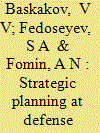

|
|
|
|
|
| Summary/Abstract |
The authors review different types of planning as a control function. They provide an essential analysis of strategic and budgetary strategic planning, directed toward creating an integrated target program for the financial activity of enterprises, including those of the defense-industrial complex.
|
|
|
|
|
|
|
|
|
|
|
|
|
|
|
|
| 17 |
ID:
080810
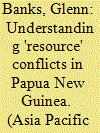

|
|
|
|
|
| Publication |
2008.
|
| Summary/Abstract |
Papua New Guinea, with its heavy dependence on natural resources, limited economic development in the past two decades, poor record of governance and high-profile separatist conflicts such as the Bougainville civil war, appears to be an exemplar of the 'Resource Curse' theory - the notion that natural resources actively undermine economic development. Using a number of examples from a range of scales, this paper argues that what appear to be 'resource' conflicts in Papua New Guinea are actually better conceived as conflicts around identity and social relationships. The very different conceptualisation of natural resources in most Melanesian societies - as elements of the social world as much as any external environmental sphere - means that resources become a conduit for local social and political agendas and tensions to be expressed. The nature of traditional conflict in Melanesian societies is discussed as a guide to the better management and resolution of what appear to be 'resource' conflicts in Papua New Guinea.
|
|
|
|
|
|
|
|
|
|
|
|
|
|
|
|
| 18 |
ID:
095809
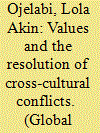

|
|
|
|
|
| Publication |
2010.
|
| Summary/Abstract |
The need to promote common goals, aspirations and shared values in the resolution of cross-cultural conflicts cannot be over-emphasized. Conflict resolution processes seek to find ways of satisfying the interests of all parties in conflict whilst promoting dialogue on issues that appear intractable. To achieve lasting outcomes, conflict resolution processes must assist in defining overarching needs, goals and interests. This article proposes that values of justice, freedom, equality, and peace are critical for cross-cultural conflict resolution and should be promoted through conflict resolution processes. Promoting values through conflict resolution processes will assist in creating overarching goals, needs and interests as well as producing lasting outcomes. In addition, promoting values will pave the way for addressing the root causes of cross-cultural conflicts.
|
|
|
|
|
|
|
|
|
|
|
|
|
|
|
|
|
|
|
|
|